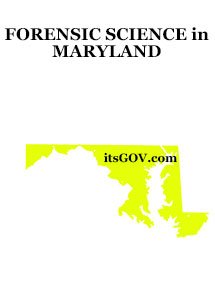Forensic Science
Forensic science combines science and investigation in order to aid and support the prosecution or defense in criminal and civil investigations. While the profession has been widely romanticized by various TV shows, make no mistake – this job is most likely different that you expect. In contrast with popular perception, this is a highly scientific role, which often involves detailed, painstaking work. Field duties are limited to a few areas of expertise, and most often than not a forensic scientist will spend his time in the lab.
If you made it this far, though, congratulations! You’re taking the first steps in joining a very rewarding profession and itsGOV is here to guide you through what you need to know and what you need to do to join a forensic science program in Maryland.
Depending on the type of forensic science practiced, different degrees and educational backgrounds may help a candidate get a job and excel in this field. Regarding formal education, requirements vary across jobs, but you should definitely have a solid background in mathematics, biology and chemistry.
The National Institute of Justice, a division of the U.S. Department of Justice, offers guidelines for model undergraduate and graduate forensic science degree programs. According to the American Academy of Forensic Science, strong programs should offer a curriculum that concentrates on scientific writing, laboratory skills, public speaking, and computer software application training.
Forensic Science Requirements in Maryland
The Forensic Science Education Programs Accreditation Commission (FEPAC) of the American Academy of Forensic Sciences accredits forensic science education programs that uphold the standards of the Academy. Most forensic science employers in Maryland require that applicants are graduates of FEPAC-accredited programs.
Most forensic scientist jobs in Maryland require that the applicant hold at minimum a bachelor’s degree. Usually a degree in one of the following fields is acceptable:
- Chemistry
- Biochemistry
- Biology
- Medical Technology
- Genetics
- Pharmaceutical Science
- Criminal Justice
- Forensic Science
If an applicant’s bachelor’s degree is not in one of the above- mentioned disciplines, he or she may still be able to apply for forensic scientist jobs in Maryland. A range of 24 to 30 undergraduate credits may be required from the following fields:
- Physical Science, such as:
- Physics
- Astronomy
- Earth Science
- Atmospheric science
- Natural Science, such as:
- Biology
- Chemistry
- Forensic Science
All science courses listed above must include a laboratory component.
Forensic Science Training in Maryland
Some forensic scientists in Maryland go on to obtain additional continuing education, and often professional certification, within a specialized discipline in forensic science. This can be helpful when seeking advancement or new challenges in a forensic science career.
Examples of organizations that provide such continuing education and/or certification include:
- American Board of Criminalistics – offers the Forensic Science Assessment Test, which can be taken to show potential employers an applicant’s advanced knowledge in Forensic Science
- American Board of Forensic Toxicology – offers certification as a Forensic Toxicology Specialist to those with a bachelor’s degree and three years of applicable experience
Forensic Science Salary in Maryland
Maryland is a good state for finding jobs as forensic scientists. There are several reasons for this.
Forensic scientist employment level. Maryland had the fifth highest level of employment of forensic scientists in the county in 2012 according to data from the Bureau of Labor Statistics (BLS). Six hundred and fifty such scientists were working in the state in 2012.
Employment levels are expected to increase to even greater levels. Maryland’s Division of Workforce Development and Adult Learning projected that 81 positions would become open for forensic scientists in the period from 2012 to 2014.
Another factor to look at that shows the availability of jobs is the concentration of jobs in the state. Maryland had the third highest concentration of forensic science jobs of any state in the county. Approximately one out of every 4000 employees in the state was a forensic scientist.
Two cities in Maryland were in the top six metropolitan areas in the country with the highest concentration of jobs. Baltimore was fifth, while Bethesda-Rockville-Frederick was sixth.
Forensic scientist salaries. The Bethesda area had the seventh highest average salary for forensic scientists of any city in the country. The average salary for the state and selected cities for 2012 is shown below, along with the average salary of experienced professionals in the 90th percentile of their wage bracket. Statewide, the average annual salary is $65810 and the 10th percentile salary is $93420.
Forensic Science Schools and Colleges in Maryland
Bachelor’s Degree Programs in Maryland
| University | University of Baltimore, Forensic Studies B.S. |
| Duration | 24 months |
| Type | Full time, Part time |
| Tuition and fees | $16,036 in-state; $37,784 out-of-state per year |
| Program link |
| University | University System of Maryland, Investigative Forensics B.S. |
| Duration | 24 months |
| Type | Full time, Part time |
| Tuition and fees | $14,956 in-state per year |
| Program link |
Master’s Degree Programs in Maryland
| University | Stevenson University, Forensics M.S. |
| Duration | 24 months |
| Type | Full time, Part time |
| Tuition and fees | $15,005 per year |
| Program link |
| University | University of Baltimore, Forensic Science – High Technology Crimes M.S. |
| Duration | 24 months |
| Type | Full time, Part time |
| Tuition and fees | $13,550 per year |
| Program link |




